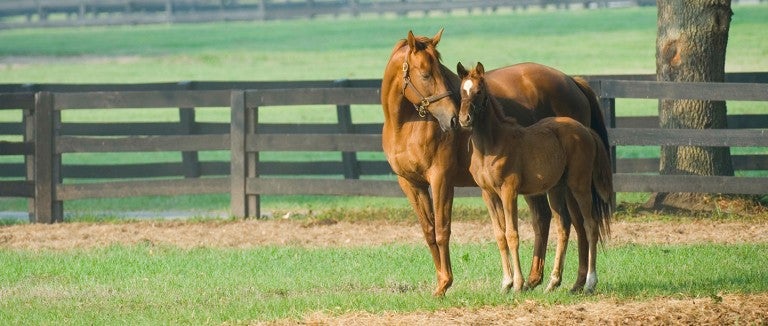While having a horse in the family can be rewarding, being a successful horse owner requires a great deal of time, money and a lasting commitment to the care and well-being of the animal. The keys to a long-term, successful relationship with a horse are twofold: making sure you choose an appropriate horse for your goals, skill level and resources, and having the knowledge and understanding to properly care for your horse daily.
First, make sure you're up for owning a horse
For most equestrians, the first step to horse ownership is riding lessons at a local barn, where children learn how to safely lead, groom, tack up and ride a horse correctly. While these experiences are a great introduction to horses and a way to gauge a child's long-term interest, they typically don't teach your child everything they need to be a successful horse owner.
A good way to test the waters of ownership is to lease a horse, paying a portion of the boarding costs for someone else's horse in exchange for riding and care privileges. You can get a better sense of how willing your child is to schlep to the barn to feed or water your horse or deal responsibly with sudden lameness or behavior challenges. If leasing isn't an option, consider gaining hands-on experience by volunteering at a local horse rescue, therapeutic riding center or community stable.
Know the costs of basic care
Whether you keep your horse at home or at a boarding barn, basic care costs a few thousand dollars per year. In addition to food (hay and grain), water (8-12 gallons per day) and shelter, horses require regular hoof care, dental care, deworming, vaccinations, tack and equipment ($200 and up). Training, lessons and attire costs quickly add up too. The purchase price is usually the cheapest part of having a horse—it's the ongoing financial outlay for care and training that can add up over time.
Where to look for a horse
First-time horse owners should not navigate the world of horse shopping unassisted. A horse-savvy friend or teacher is a good resource, as are the hundreds of horse rescue organizations across the country. These rescues take in adoptable horses and match them up with appropriate adopters. Rescues are primarily interested in ensuring the horse and rider are a good match. They have a variety of horses to choose from—and if a horse doesn't work out, they will typically take the horse back. You may also want to look into the sizeable network of responsible horse breeders across the U.S. These breeders can play a key role in preventing neglect, starvation and slaughter by reducing the number of surplus horses they breed, rejecting slaughter in their business model and taking responsibility for ensuring a humane life for each horse they sell.
The breeding-slaughter connection
The continued availability of horse slaughter has allowed—even encouraged—some horse breeders to behave irresponsibly. They produce foals for whom there is no clear demand or lifelong plan and they incorporate the possibility of slaughter into their business model to cull their herd and dispose of surplus animals. Responsible breeders save horses from slaughter by not only lowering the number of surplus animals, but also by properly training each horse for a long and successful life with their owner.
The Responsible Horse Breeders Council
In recognition of the key role breeders play in reducing horse suffering, the Humane Society of the United States has organized the Responsible Horse Breeders Council. The council:
- Educates members of the public, as well as current and potential horse breeders, about responsible horse breeding and efforts to reduce the number of U.S. horses sent to slaughter.
- Develops and advocates for public policy positions and educational initiatives to discourage overbreeding.
- Informs horse owners about the costs and responsibilities of horse ownership.
- Supports efforts to retrain and rehome at-risk horses.
Be ready for a lifelong commitment
Horses can live well into their thirties and many remain rideable well into their twenties. Are you willing to provide care to the horse for the remainder of his life? If you can't provide care, are you willing to find another loving home for the horse? Many new horse owners don't realize that horses sent to weekly livestock auctions may be sold to middlemen for slaughter plants, which brutally slaughter slaughter horses for human consumption abroad. If you have a horse for whom you can no longer care, find a humane way to relinquish them.
